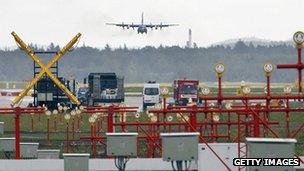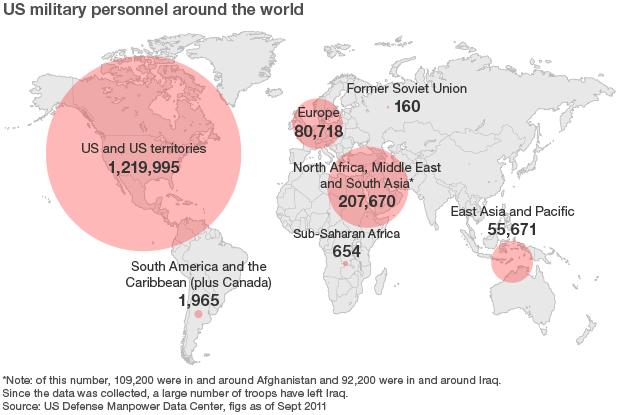US to withdraw two Europe combat brigades
- Published

The US base at Ramstein in Germany is home to thousands of troops
The US is to withdraw some 7,000 combat troops from Europe, Defence Secretary Leon Panetta has announced, as part of measures to reduce military spending.
The troops, making up two combat brigades, will be replaced with rotational units to ensure a continued strong presence in the region, he said.
Some 80,000 US military personnel are currently based in Europe.
The move comes a week after President Barack Obama said the US military would become "leaner" over the next 10 years.
The new strategy, external is designed to accommodate at least $450bn (£290bn) in Pentagon cuts over the next decade while redirecting attention to the Asia-Pacific region.
In an interview with the American Forces Press Service, Mr Panetta said America's security commitments to Europe and to Nato were "unwavering".
"We will continue to maintain our presence both in the Middle East and Asia," he said.
"Yes, we'll have the Navy and the Air Force, but in my experience, in any conflict you need to have the potential use of ground forces."
'Agile, deployable'
Rotating troops in and out of Europe, rather than having them stationed there, would mean they did not have to be accompanied by their families - a considerable reduction in cost.
"Our budget is basically designed to reinforce the new missions we are talking about and that agile, deployable and ready force that has to move quickly," said Mr Panetta.
He said he had spoken to European allies about the changes, but did not give a timescale for the withdrawals.
The US currently has four combat brigades stationed in Europe - three in Germany and the fourth in Italy. Each brigade has about 4,000 members. The troops have regularly been deployed from Europe to combat duties in Iraq or Afghanistan.
In his announcement last week, Mr Obama said the tide of war was receding and that the US must now focus on renewing its economic power.
He was seeking to end "long-term nation building with large military footprints", he said, and instead allow the Pentagon to pursue a national security strategy based on "smaller conventional ground forces".
In the future, the US "will no longer need to be sized to support the large-scale, long-term stability operations that dominated military priorities and force-generation over the past decade".

- Published5 January 2012
- Published5 January 2012
- Published5 January 2012